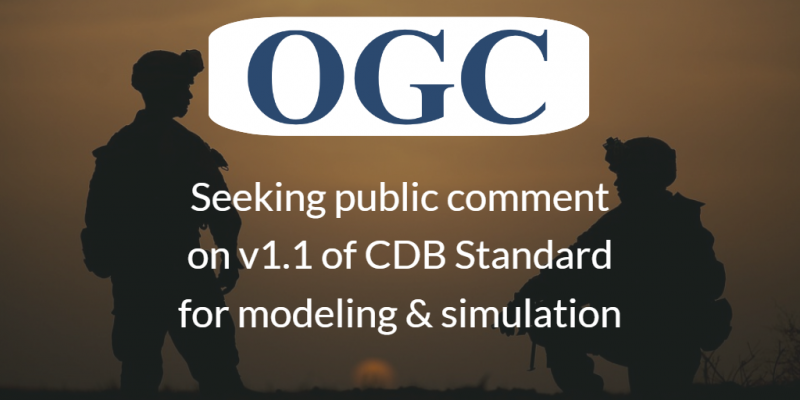Minor update to CDB standard brings guidance on metadata, vector network priority, and more.

The Open Geospatial Consortium (OGC) seeks comments on the candidate CDB version 1.1 standard. CDB version 1.1 is a minor revision and is fully backwards compatible with Version 1.0.
The CDB standard defines a conceptual model, as well as rules for implementing the model, for the storage, access, and modification of a synthetic environment data store as required in high-fidelity simulation and mission rehearsal, such as for battlefield simulation. The standard addresses the challenge of full plug-and-play interoperability and reuse of geospatial data in a modeling and simulation environment. CDB data stores can also be exposed by OGC web services, such as a Web Map Service (WMS) or Web Feature Service (WFS) to permit visualization of the content outside of the traditional simulator hardware environment.
The main revisions for this version of the CDB standard are:
- Detailed guidance on how to implement geospatial metadata in a CDB data store. This guidance is independent from the metadata standard that an organization wishes to use;
- Incorporation of additional guidance requested by the CDB user community on such topics as vector network priority and significant size;
- Updates to the CDB schema to add additional lights and feature types as well as spelling corrections and changes to support geospatial metadata;
- Numerous minor changes to correct ambiguous wording, incorrectly formatted tables, spelling errors and so forth.
A detailed description of the changes to the CDB standard can be found in the CDB 1.1 release notes.
The candidate OGC CDB Version 1.1 Standard is available for review and comment by downloading this zip file from the OGC Portal. Comments are due by 30 April 2018 and should be submitted via the method outlined on the CDB Version 1.1 requests page.
About OGC
The Open Geospatial Consortium (OGC) is an international consortium of more than 525 companies, government agencies, research organizations, and universities participating in a consensus process to develop publicly available geospatial standards. OGC standards support interoperable solutions that ‘geo-enable' the Web, wireless and location-based services, and mainstream IT. OGC standards empower technology developers to make geospatial information and services accessible and useful within any application that needs to be geospatially enabled. Visit the OGC website at www.opengeospatial.org.
“






